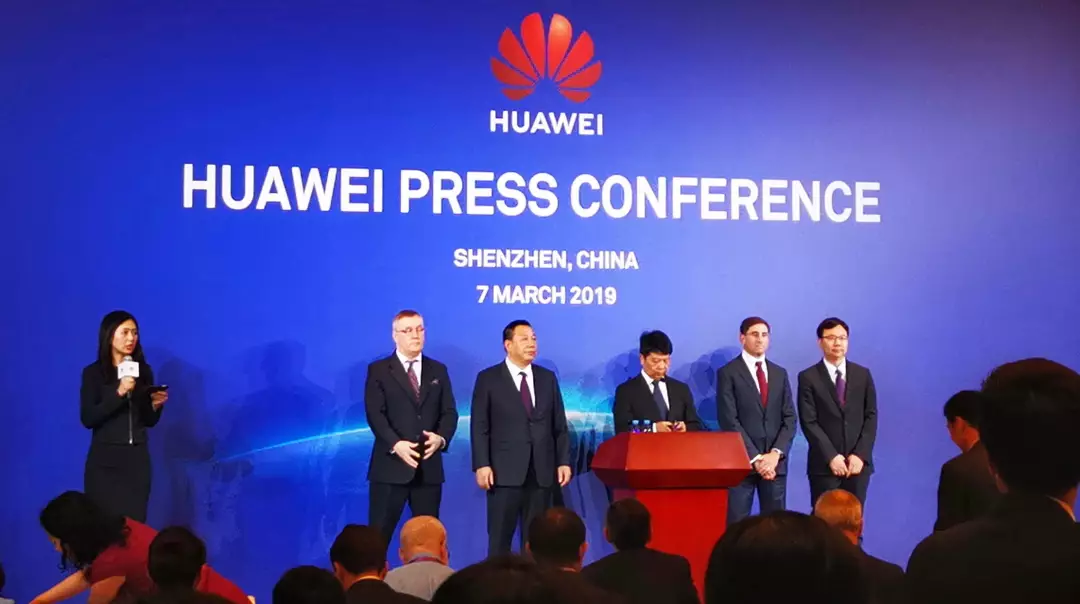华为在起诉状中的声明
(译者:小世儿(北京))

一、美国宪法的制定者们非常担忧立法权被滥用的可能。他们认为“立法部门到处扩展其活动范围,并将所有权力汇集到其鲁莽的漩涡中”。所以,“人们应该唤起他们所有的守护之心,并用尽各种预防措施,来阻止这个部门野心的扩张。”(注:引自《联邦党人文集》第48篇,詹姆斯·麦迪逊著)因此,制宪者只授予国会有限的、已被明确列举的立法权;并将这些权力分配给众议院和参议院两个机构;限制这些权力只能依照严格的程序使用;同时将行政和司法权力归属于独立并分立的政府分支。
二、制宪者特别关注的一个问题,是立法机关会利用其权力,针对特定的个体,制造不利于其的状况。制宪者认为,如果立法机关本身可以对具体人员进行制裁,而“不经过行政机关或法院的听证或审判”,那么“没有人是安全的,也没有人知道他什么时候就可能成为主流派系的无辜受害者。”(注:引自《亚历山大·汉密尔顿文集》,第485至486页,Harold C. Syrett编)
因此,即便制宪者已授予国会明确列举的立法权,他们禁止它使用这些权力,去制定“未经司法程序而实施褫夺公民权的法案”(Bills of Attainder),这种法案专门针对立法机关筛选出的特定个体进行惩罚。
此外,通过正当程序条款(Due Process Clause),制宪者们禁止立法者将某些人单独挑出,并剥夺其自由。最后,通过归属条款(Vesting Clauses)和由此产生的权力分立,制宪者禁止那种不是制定普遍规则,而是将规则针对某个案件或个人的立法。
三、2019财年《国防授权法案》第889节的条款违反了这些宪法限制。特别是第889节,专门针对原告华为技术有限公司,以及华为技术有限公司的子公司和附属公司,如原告华为技术美国公司。
第889节明确提到华为的名字,以立法的形式裁定它与中国政府有关联。它不单禁止美国政府机构自身购买华为设备及其服务,并且禁止政府跟其他购买或者使用华为的第三方机构签订合约、或向其拨款或提供贷款,无论这些华为的设备和服务是否会对美国政府造成任何影响,或与其有任何关联。
这些禁令的目的和实际效果,是阻止华为进入美国通信设备和服务市场的核心区域。因此,第889节对华为造成了直接且持续的经济、竞争力、以及声誉上的损害。
四、第889节永久性地对华为施加了这些负担和制裁,而没有给予其一个公平的听证会或是反驳对其指控的机会,也没有给予其逃离指控的机会。
该法令公开明确地将这些禁令和制裁专门适用于华为,和另一个指定实体(注:指中兴)。相比之下,该法规赋予国防部长权力——与FBI局长或国家情报总监协商后——可以判断其他实体是否由中国政府所有、所控或者有其他形式的关联。然后这些判定会根据《行政程序法》(Administrative Procedure Act)进行司法审查。
该法规规定,如果这些美国官员发现有关特定实体的事实已发生变化,则可自行更改其判定。但这些官员对华为没有这样的自由裁量权:即使这些官员明确发现华为与中国政府不存在关联,针对华为的禁令和制裁仍将存在。
简而言之,第889节将华为列入黑名单,禁止它进入美国通信市场的核心部分。而所有这些决定做出之前,都没有给予华为一个公平的听证会——一个它可以被告知并反驳针对它指控的机会。
五、这样做的过程中,第889节至少违反了三项宪法规定:它违背了“不能未经司法程序而实施褫夺公民权的法案”(Bills of Attainder Clause)”,将华为单独挑出来惩罚——它将华为列入黑名单,质疑其声誉及其遵守美国法律的具体承诺,并拒绝华为通过任何途径为自己正名并免除制裁。
第889节也违反了”正当程序条款”,它选择性地剥夺了华为的自由——严重限制其开展业务的自由,通过将华为包装成中国政府的工具和美国安全的隐患来诋毁华为,并拒绝华为在面对国会指控时,采取任何未被剥夺自由时的法律程序。
并且,第889节违反了“归属条款”(Vesting Clauses)以及由此产生的权力分立。它通过立法的方式,裁定华为因其与中国政府的所谓关联而“有罪”,并暗示其对美国的安全构成威胁——而不是交给行政机关和法院来做出此类指控并予以裁决。
六、此外,作为一个实际操作问题,第889节对华为(和另一家公司中兴)的关注,显然是基于华为技术有限公司的所属国,但这不能说明任何问题。第889节允许其他在中国拥有广泛业务和与中国政府签订合资协议的制造商,继续向美国政府、以及美国政府的承包商、拨款及贷款接受者出售设备的同时,单独拎出华为——一家非政府掌控,由私人董事会控制的私营公司——以及另一个公司实体(注:指中兴),令它们面对影响广泛的不利待遇。
此外,美国政府已经意识到,由于全球供应链中存在的弱点,世界上几乎所有电信设备制造商都面临着网络安全的风险。然而,第889节没有针对这些全球供应链风险。
因此,如果第889节的核心目的,是防止中国生产的设备被美国政府直接或间接使用,只针对华为的法规显然是无效的。此外,889节过于宽泛,因为它禁止(政府承包商)使用或(政府拨款和贷款接收者)购买华为的设备和服务,即使华为的设备或服务不是用来支持政府的相关功能。
七、简单来说,第889节不仅与美国及其公民的经济利益相左,而且不能有效促进美国的国家安全,还违反了美国宪法。
华为是一家世界领先的信息通信产品和服务供应商。不管是在美国还是世界其他地方,当其他公司不能有效提供服务、或完全不提供服务的时候,华为提供了更先进的设备,并维持了比同行更低的价格。
没有华为的设备和服务,美国市场的消费者(尤其是在乡村及贫穷地区)接触最先进技术的途径将被剥夺,他们将面临更高的价格以及一个显著缺乏竞争的市场。尤其是在5G移动服务领域,美国消费者将难以接入最新技术的网络,并饱受二流服务的折磨。
华为的设备和服务遵守安全程序,没有植入任何后门。在世界上170个正在使用华为的国家,均不存在任何记录在案的安全问题。
另外,即便全球供应链中确实存在一些风险,需要全面的供应链策略与规范去化解,但把诸如华为等公司单独挑出,并置入黑名单的这种行为,并不合理,也不会有效。
的确,如我们之前所提到的,华为是一家未上市的私营企业,由私人董事会控制。虽然法院没有权力保护人们免受《国防授权法案中》中所有不明智规定的侵扰,但他们有义务保护华为以及其他主体免受其违宪部分的损害——包括专门针对华为进行惩罚;跳过中立公正的审讯,直接剥夺华为的自由;以及剥夺宪法规定下,行政与司法机关的起诉与裁决权。
原告请求法院判决889节中的相关内容违宪并禁止其实施,同时对《国防授权法案中》中的其他内容,以及889节的剩余部分不作处理。
(点击底部阅读原文,查看54页起诉状英文全文)
PRELIMINARY STATEMENT
1. The Framers of the United States Constitution were deeply concerned about the potential abuse of legislative power. They believed that “[t]he legislative department is everywhere extending the sphere of its activity, and drawing all power into its impetuous vortex,” and that as a result, “[i]t is against the enterprising ambition of this department that the people ought to indulge all their jealousy and exhaust all their precautions.” The Federalist No. 48 (James Madison). The Framers accordingly granted Congress only limited and enumerated legislative powers; divided these powers between a House of Representatives and a Senate; subjected the exercise of these powers to strict procedures; and vested the executive and judicial powers in separate, independent branches of the government.
2. One of the Framers’ particular concerns was that the legislature would use its power to target specific individuals for adverse treatment. The Framers believed that, if the legislature could itself sanction specific persons “without hearing or trial” conducted by the Executive or the courts, “no man can be safe, nor know when he may be the innocent victim of a prevailing faction.” The Papers of Alexander Hamilton, at 485–86 (Harold C. Syrett ed. 1961–1979). Thus, even where the Framers otherwise granted Congress enumerated legislative powers, they prohibited it from using those powers to enact bills of attainder that impose punishment on specific individuals identified by the legislature. Further, through the Due Process Clause, they prohibited legislation that would single out particular persons for deprivations of liberty. Finally, through the Vesting Clauses and the resulting separation of powers, the Framers prohibited legislation that, rather than simply enacting a general rule, applied a rule to an individual case or person.
3. Provisions of section 889 of the 2019 NDAA violate these constitutional limitations. In particular, section 889 specifically targets Plaintiff Huawei Technologies Co., Ltd., and its subsidiaries and affiliates, such as Plaintiff Huawei Technologies USA, Inc. Section 889 calls out Huawei by name, legislatively adjudicates it to be connected to the Government of the People’s Republic of China, and precludes U.S. government agencies not only from purchasing specified Huawei equipment and services, but also from contracting with or awarding grants or loans to third parties who purchase or use such equipment or services—regardless of whether the equipment or services have any impact on or connection to the government of the United States. The actual and intended effect of these prohibitions is to bar Huawei from significant segments of the U.S. market for telecommunications equipment and services, thereby inflicting immediate and ongoing economic, competitive, and reputational harms on Huawei.
4. Section 889 permanently imposes these burdens and sanctions on Huawei without giving it a fair hearing or the opportunity to rebut the allegations against it, and without opportunity for escape. The statute specifically and expressly applies these broad prohibitions and sanctions only to Huawei and one other named entity. In contrast, the statute gives the Secretary of Defense, in consultation with the FBI Director or the Director of National Intelligence, authority to determine whether other entities are owned or controlled by, or otherwise connected to, the Chinese government—determinations that are then subject to judicial review under the Administrative Procedure Act. The statute affords those Officers of the United States the discretion to change their determinations if they find, for example, that the facts about a particular entity have changed. But those Officers have no such discretion with respect to Huawei: even if those Officers definitively find that Huawei has no connection to the Chinese government, the prohibitions targeting, and sanctions imposed on, Huawei will remain in place. In short, section 889 blacklists Huawei and bars it from significant sectors of the U.S. telecommunications market, all without giving Huawei a fair hearing at which it could be informed of and confront the accusations made against it.
5. In so doing, section 889 violates at least three constitutional provisions: It violates the Bill of Attainder Clause by singling out Huawei for punishment—blacklisting it, impugning both its general reputation and its specific commitment to honoring the laws of the United States, and denying it any procedure through which it can clear its name and escape sanction. Section 889 also violates the Due Process Clause by selectively depriving Huawei of its liberty— severely curtailing its freedom to do business, stigmatizing it by effectively branding it a tool of the Chinese government and a risk to U.S. security, and denying it any pre-deprivation legal process to confront the congressional charges against it. And section 889 violates the Vesting Clauses and the resulting separation of powers by legislatively adjudicating Huawei to be “guilty” of an alleged connection to the Chinese government, and by implication a threat to U.S. security, rather than leaving it to the Executive and the courts to make and adjudicate any such charges.
6. Moreover, as a practical matter, section 889’s focus on Huawei (and one other company), apparently based on Huawei Technologies Co., Ltd.’s national origin, makes no sense. Section 889 permits manufacturers with extensive operations in China and joint venture agreements with the Chinese government to continue to sell equipment to the U.S. Government and its contractors and grant and loan recipients, while legislatively singling out Huawei—a private, non-government-owned company controlled by a private Board of Directors—and just one other entity for sweeping adverse treatment. Further, the government itself has recognized that virtually all manufacturers of telecommunications equipment in the world face cybersecurity risks as a result of vulnerabilities in the global supply chain. Yet section 889 does nothing to address these global supply chain risks. Thus, if the central purpose of section 889 is to prevent Chinese-origin equipment from being used, directly or indirectly, by the U.S. Government, the provision is ineffective on its face. Moreover, it is overbroad, because it bars use (by government contractors) or purchase (by government grant and loan recipients) of Huawei equipment and services even where Huawei equipment or services are not being used to support a government- related function.
7. In short, Section 889 is not only contrary to the economic interests of the United States and its citizens, and ineffective at advancing U.S. security interests, it is also contrary to the Constitution of the United States. Huawei is a world-leading provider of information and communications technology products and services, offering more advanced equipment at lower costs than any other such company, and doing so in areas of the world and of the United States that other providers serve less effectively or not at all. Without Huawei equipment and services, consumers in the United States (particularly in rural and poor areas) will be deprived of access to the most advanced technologies, and will face higher prices and a significantly less competitive market. In the area of 5G mobile service in particular, American consumers will have reduced access to state-of-the art networks and suffer from inferior service. At the same time, Huawei equipment and services are subject to advanced security procedures, and no backdoors, implants, or other intentional security vulnerabilities have been documented in any of the more than 170 countries in the world where Huawei equipment and services are used. Moreover, while there are real risks in the global supply chain that can and should be addressed by comprehensive supply chain strategies and rules, those risks are not rationally or effectively addressed by singling out and blacklisting equipment of specific companies such as Huawei. Indeed, as noted, Huawei is a privately-owned company controlled by a private Board of Directors. While courts do not have the authority to protect the people from all the ill-advised aspects of the NDAA, they do have the duty to protect Huawei and others from its unconstitutional aspects—including its specific targeting of Huawei for punishment, its deprivation of Huawei’s liberty without a fair and impartial hearing, and its usurpation of the charging and adjudicative powers reserved by the Constitution to the executive and judicial branches. Plaintiffs respectfully request that the Court declare unconstitutional and enjoin enforcement of those discrete aspects of section 889 that violate the Constitution, while leaving all other aspects of the NDAA, and the remainder of section 889 itself, intact.




